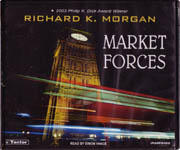
 Market Forces
Market Forces
By Richard K. Morgan; Read by Simon Vance
13 CDs – 16 Hours [UNABRIDGED]
Publisher: Tantor Media
Published: 2005
ISBN: 1400101395 (Retail CD), 1400131395 (Library CD), 1400151392 (MP3-CD)
Themes: / Science Fiction / Dystopia / Economics / Satire /
“Human beings have been fighting wars as long as history recalls. It is in our nature, … last century the peacemakers, the governments of this world, did not end war. They simply managed it, and they managed it badly. They poured money without thought of return into conflicts and guerrilla armies abroad, and then into tortuous peace processes that more often than not left the situation no better. They were partisan, dogmatic, and inefficient. Billions wasted in poorly assessed wars that no sane investor would have looked at twice. Huge, unwieldy national armies and clumsy international alliances in short a huge public sector drain on our economic systems. Hundreds of thousands of young people killed in parts of the world they could not even pronounce properly. Decisions based on political dogma and doctrine alone. Well, this model is no more.”
In an interview with Rick Kleffel of The Agony Column Richard K. Morgan describes the motivaton behind Market Forces – ‘there’s a scene’ he said, ‘in the movie Lethal Weapon‘ a scene in which the suicidal cop Martin Riggs (played by Mel Gibson) is atop a roof, ironically, trying to talk down an suicidal citizen who claims he’s going to jump. Frustrated at the indecision that grips them both Riggs snaps – he handcuffs the citizen to his own wrist and then asks him “Do you really wan’t to jump? Do you wanna?” – then dragging the citizen with him Riggs jumps off the roof. It’s a scene designed to show the inner demons that haunt Riggs, who is, after all, the “Lethal Weapon” of the film’s title. So what does that have to do with Market Forces? This novel is Richard Morgan’s response to the right-wing think tanks which have for years been constantly murmuring in the media soundbites of “let the market decide,” “government is in the way of business,” “the invisible hand can regulate better.” Morgan’s frustration with these ideologues is answered by dystopian satire, a kind of Wall Street meets Mad Max. This is an England in which the gap between the rich and poor has widened. At the top are an elite, an upper-class of executives, driving armoured cars and carrying firearms in their briefcases. At the bottom are the unemployed, disenfranchized and living in deserted slums without access to public transportation, their only escape is to join the police or Special Air Service, both privatized and in mercenary service of the executive class. The commodited investment houses have morphed into “Conflict Investment” houses. It’s a powerful setting, a critical look at where we are now, as 1984 and Farenheit 451 were critical looks at where we used to be – a place we must still fight from going. In essence Morgan says ‘This is what happens when you look at what we’re doing now and then project ahead. This is what happens if you listen to the right-wing think tanks. This is what happens when you jump.’
As a primer let me explain how “conflict investment” works. You find a country, one torn by civil war or revolution. You decide who, amongst the many factions within that country could win, given the right resources and then you back them. In return for providing the arms, equipment and intelligence to win a “small war” the faction must commit to give you a cut of their country’s gross domesitc product for a quarter century or so. Our viewpoint character, Chris Faulkner, has recently been hired on as a junior associate by one of the top conflict investment firms, Shorn Associates – this happened in large part because of Chris’ reputation for savage road duelling. Meanwhile, Chris’ wife, a mechanic from Sweden, (a country with one of the last socialist governments around) is encouraging him to seek more peaceful pastures by defecting to a struggling international peace movement. With rebels in Guatemala to support and a growing record of auto-duel kills Chris is a hot number, but it increasingly seems like someone is setting him up for a fall. It’s up to Chris to decide whether he’s going to be the person his wife wants him to be or if he’s going to continue on his road to corporate partnership.
I ended up really liking Market Forces. There was a time there when I wasn’t sure, the first third of the novel is quite depressing, Morgan’s world has gone to shit and the people in it smell, and smell bad. Part of my problem was with how the world got to be this way. A corporate world full of scum? I can understand that, but a corprate world full of armed scum? It seemed a bit proposterous. Then it came to me, between discs 4 and 5 I realized, “this is a satire”. Like American Pyshco or that corporate raiders sequence in Monty Python’s The Meaning Of Life. Eventually Morgan does give an explanation of how we got from where we are now to the fifty or so years from now setting of Market Forces and that explanation works in a ‘give me an inch and I’ll give you a novel’ sort of way. The real explanation however is that to be the story it needed to be actual market forces really had to play into every human transaction. The brutal reality of competitive of an unregulated capitalism working at full force would likely still be insulated by an old boys network, an oligarchy that said it wanted unrestricted competition, but really just wanted power. In arming and glorifying the auto duels Morgan has made Chris Faulkner confront the reality of the world he is making. Ultimately the decision he faces is as terrible as those made by Winston Smith in Nineteen Eighty-Four and Guy Montag in Fahrenheit 451. It remains to be seen whether Market Forces will be as enduring as those dystopian novels, but it stands among them, bare face in the portrayal of a brutal tommorow based on the unchecked trends of today.
This is a gloomy book marked by several scenes of jagged action and carnal sex, it is a good thing Tantor Media chose a versatile reader. Narrator Simon Vance used his precise English accents to portray the undertones of resentment many of the characters didn’t even realize they had – it carried me through the gloomy bits to the dramatic conclusion. Tantor issued us another of the library retail bound CD editions, though it had identical packaging to Altered Carbon (recently reviewed) two of the indivudal pages came loose in this one while I was pawing through. UPDATE: The good folks at Tantor have informed me that they actually sent the retail edition to us. The library edition is higher priced and comes in a white box with a metal ring binder (as well as a free lifetime CD replacement guarantee).
In researching for the review I found out that Market Forces is based on an unpublished seedling of a short story, entitled Some Serious Driving. Apparently it was originally submitted to Interzone magazine, they rejected it as full of ‘unlikable characters’ – something the novel has too. In an ideal world I’d have liked to see Some Serious Driving bundled in as an extra, perhaps Tantor Media can gather together all of the Richard K. Morgan unpublished shorts to tide us over until the 5th RKM novel comes out?
One last thing, given my description of the plot you might think Market Forces a standalone novel and indeed it does stand nicely on its own- the thing is I found strong evidence that Market Forces is set in the same universe as that of the Takeshi Kovach novels, the books Richard Morgan is best known for. There’s a number of references to conflict investment in general and the Shorn corporation in particular in Broken Angels, the second Takeshi Kovach novel. Cool huh?
Posted by Jesse Willis






